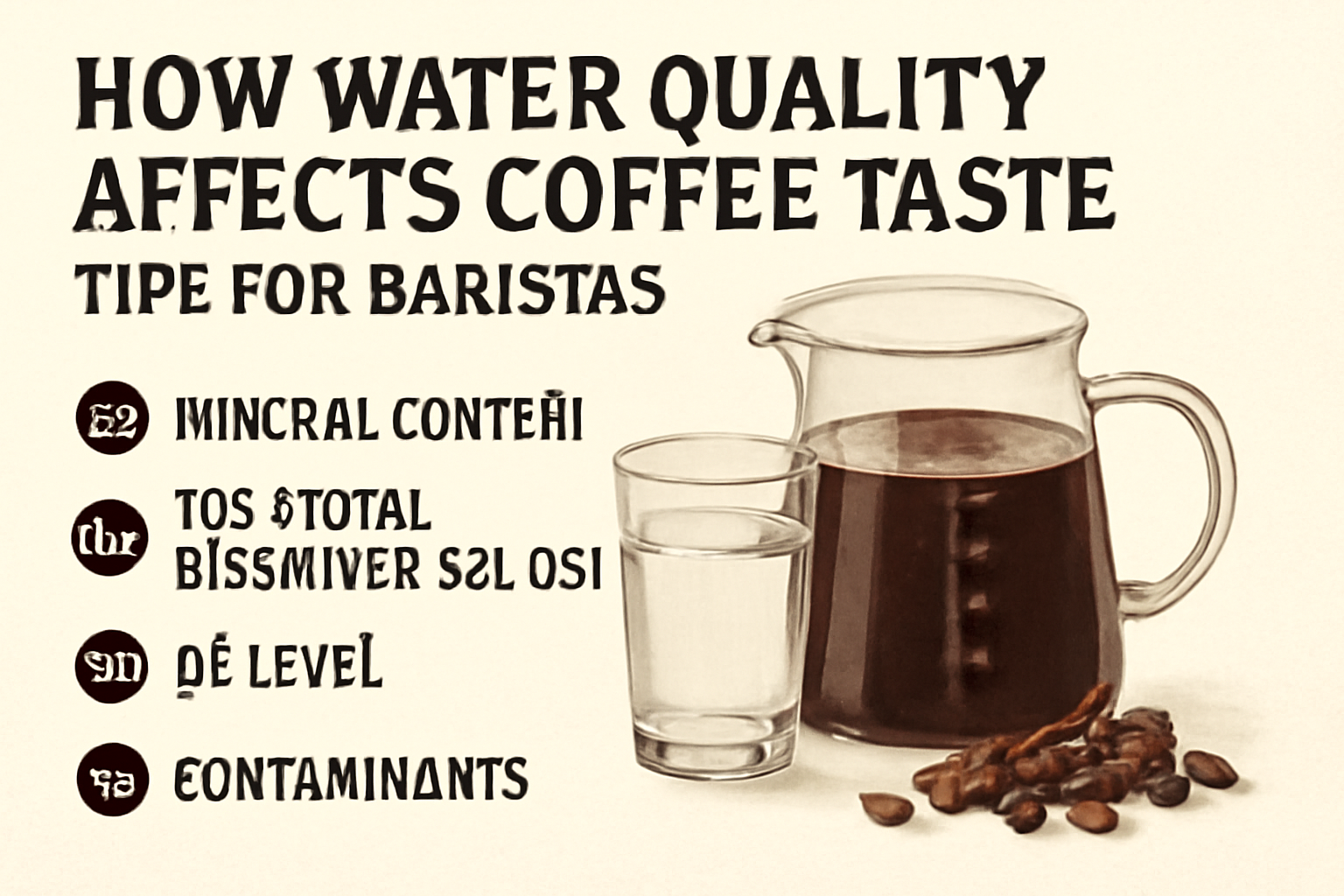Water quality is one of the most overlooked yet critical factors influencing the taste and quality of coffee. Since coffee is brewed with approximately 98% water, the chemical composition, mineral content, and purity of water can significantly affect extraction, flavor clarity, and overall cup consistency. For baristas and coffee professionals aiming to craft the perfect cup, understanding how water quality impacts coffee taste and knowing how to manage it is essential. This comprehensive guide explores the relationship between water quality and coffee flavor, the ideal water parameters for brewing, and practical tips for baristas to optimize water use in their daily operations.
At its core, coffee brewing is a chemical extraction process where water dissolves desirable soluble compounds from ground coffee. The extraction efficiency and balance depend heavily on water’s physical and chemical properties. Variables such as total dissolved solids (TDS), pH, hardness, alkalinity, and presence of contaminants influence how coffee flavors develop during brewing.
The total dissolved solids in water refer to the concentration of dissolved minerals and salts. These minerals interact with coffee grounds and contribute to flavor extraction. Water with very low TDS, such as distilled or reverse osmosis (RO) water, can produce flat and under-extracted coffee because it lacks minerals to facilitate proper extraction and flavor balance. Conversely, water with excessively high TDS may over-extract coffee, resulting in bitterness and harshness.
Water hardness, mainly due to calcium and magnesium ions, affects extraction by influencing coffee solubility. Moderate hardness enhances flavor clarity and sweetness, but too much hardness can cause scale buildup in equipment and introduce undesirable flavors. Alkalinity, mostly from bicarbonates, buffers acidity during brewing. High alkalinity tends to mute coffee acidity and dull bright flavor notes, whereas very low alkalinity can result in overly sharp or sour coffee.
The ideal water for coffee brewing has balanced mineral content and neutral to slightly acidic pH (around 6.5 to 7.5). The Specialty Coffee Association (SCA) recommends water with TDS between 75 to 250 ppm, calcium hardness around 17 to 85 ppm, alkalinity between 40 to 70 ppm, and pH near neutral. Achieving these parameters ensures optimal extraction, highlighting coffee’s complex aromas and flavors.
Water quality also affects equipment maintenance. Hard water causes scale deposits in boilers, espresso machines, and grinders, reducing efficiency and lifespan. Baristas should regularly descale equipment and monitor water hardness to prevent damage.
To assess water quality, baristas can use water test kits or send samples to labs. Testing allows understanding mineral composition and detecting contaminants like chlorine, chloramines, iron, or heavy metals, which negatively impact taste. Chlorine and chloramines, common in municipal water, produce unpleasant odors and off-flavors, so water filtration systems that remove these chemicals are essential.
Many specialty coffee shops invest in water treatment systems tailored for brewing needs. Reverse osmosis (RO) combined with remineralization filters is popular, providing pure water with controlled mineral content. Carbon filters remove chlorine and organics, improving taste and protecting equipment. Adjusting mineral content with blending or adding mineral drops can fine-tune water to enhance specific coffee profiles.
Baristas should also consider water temperature, which interacts with water quality to affect extraction. Water heated between 195°F and 205°F (90°C to 96°C) extracts the optimal range of flavors. Uneven or fluctuating temperature combined with poor water quality can cause inconsistent results.
In practice, baristas can optimize coffee taste by regularly monitoring water parameters and adjusting treatment accordingly. Maintaining clean water reservoirs, using filtered or bottled water if necessary, and educating staff about water’s role in coffee quality are best practices. Collaborating with local water experts or suppliers helps ensure consistent water quality.
Understanding how water quality affects coffee taste empowers baristas to troubleshoot flavor issues like sourness, bitterness, or flatness. For instance, overly sour coffee may indicate low alkalinity or overly soft water, while bitterness could stem from hard water or excessive minerals. Flat coffee might result from pure but mineral-deficient water.
In conclusion, water quality is a fundamental component of coffee brewing that directly influences flavor, extraction, and equipment health. Baristas who prioritize water testing, filtration, and treatment can unlock the full potential of their coffee beans and deliver a superior cup every time. Investing in water quality management is not just about equipment longevity but a vital step towards achieving consistent, delicious coffee that delights customers and stands out in the competitive specialty coffee market.

